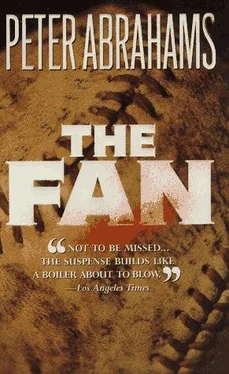Peter Abrahams - The Fan
Здесь есть возможность читать онлайн «Peter Abrahams - The Fan» весь текст электронной книги совершенно бесплатно (целиком полную версию без сокращений). В некоторых случаях можно слушать аудио, скачать через торрент в формате fb2 и присутствует краткое содержание. Жанр: Триллер, на английском языке. Описание произведения, (предисловие) а так же отзывы посетителей доступны на портале библиотеки ЛибКат.
- Название:The Fan
- Автор:
- Жанр:
- Год:неизвестен
- ISBN:нет данных
- Рейтинг книги:4 / 5. Голосов: 1
-
Избранное:Добавить в избранное
- Отзывы:
-
Ваша оценка:
- 80
- 1
- 2
- 3
- 4
- 5
The Fan: краткое содержание, описание и аннотация
Предлагаем к чтению аннотацию, описание, краткое содержание или предисловие (зависит от того, что написал сам автор книги «The Fan»). Если вы не нашли необходимую информацию о книге — напишите в комментариях, мы постараемся отыскать её.
The Fan — читать онлайн бесплатно полную книгу (весь текст) целиком
Ниже представлен текст книги, разбитый по страницам. Система сохранения места последней прочитанной страницы, позволяет с удобством читать онлайн бесплатно книгу «The Fan», без необходимости каждый раз заново искать на чём Вы остановились. Поставьте закладку, и сможете в любой момент перейти на страницу, на которой закончили чтение.
Интервал:
Закладка:
“Forget it. I’m not tired.”
Burrows took a deep drag on his cigarette, let the smoke drift slowly from his nostrils. His eyes grew dreamy, just for a moment.
“There’s tired and there’s tired,” he said.
“What’s that supposed to mean?”
“It means I got to take care of my players. That’s what managing’s all about nowadays. Protecting the investment. It’s a long season. Don’t need to tell you that, Bobby.”
“The rib cage is fine,” Bobby said. “Never was anything wrong with it. And I’m not tired, in any meaning of the word.”
“You’re a tiger, Bobby. That’s one of the reasons you’re… what you are. Why we’re so doggone glad to have you here. But sometimes even tigers got to rest.” He dropped the cigarette on the floor and ground it under his heel. “Just for the day, big guy. Take some of the pressure off.”
“I’m not feeling any pressure.”
“ ’Course not.” Burrows rose. “Just for today, then.”
And who’s going to start in my place? That was the question in Bobby’s mind, but he didn’t ask it.
He dressed: the number-eleven T-shirt first, then sleeves, jock, sanitaries, stirrups, pants, cleats, warm-up jersey-and walked down the tunnel to the dugout. The lineup was already taped to the wall. Rayburn was at the bottom, with the rest of the reserves. Someone named Simkins was playing center field and batting seventh. The name meant nothing to Bobby. He scanned the field, found the newcomer in the batting cage, recognized him after some thought: the kid from spring training, the phenom with the all-arm swing and the too-quick feet, who hadn’t even made it to the final cut. Now he was back. Bobby watched him rattle three balls off the center-field fence, then rocket a few more onto the street. In a few months the kid had turned into Ted Williams.
When Bobby’s turn came, he didn’t think about picturing baseballs or feeling feelings. He just swung as hard as he could, and the ball started taking off all over the yard. The most vicious drive of all tore past Primo’s head in shallow left. Primo didn’t flinch, didn’t move at all, just stood there relaxed and arrogant, like a matador. Bobby went into the dugout, part way down the tunnel, then swung his bat as hard as he could at the cement wall. It splintered in his hands. He felt a little better.
The feeling lasted until the fourth inning. Bobby sat in the dugout beside Boyle, chewing gum. The Yankees on a sunny Saturday afternoon. S.R.O. Zero-zero. Then, with two out and nobody on, the kid jerked one down the line in left, fair by five or six feet, and gone. He ran quickly around the bases, head down, keeping the smile off his face. The crowd rose, the way crowds do for someone’s first big-league home run.
“Why do they do that?” Bobby said.
“Why do they do anything?” said Boyle, spitting a thin jet of tobacco juice between his feet.
That helped, but not enough. The cleansed feeling that had come from smashing the bat kept slipping away. Then, in the top of the fifth, the kid made a good, not great, over-the-shoulder catch in the triangle to save a run, and got another standing O as he ran off. The cleansed feeling vanished completely, replaced by an internal stew of bottled-up energy, adrenaline, aggression. On the outside Bobby was perfectly still. The tension between the two states was unbearable, made him want to smash again, and shout, and tear onto the field.
In the ninth the bullpen broke down, and they fell behind, three to one. Simkins led off the bottom of the inning, went to a full count, and walked on a close pitch. Where was that, ump? thought Bobby, or perhaps he’d said it aloud: Boyle’s eyes shifted his way for a moment. Lanz struck out and Zamora flied to right. The aisles clogged with fans trying to beat the traffic. Then Primo doubled off the wall in right center. They held the kid at third.
“Bobby?”
Bobby looked up. Burrows was standing in front of him.
“Could use a little bingle,” Burrows said.
“You’re putting me in?”
“Why not?”
Bobby went to the bat rack, looked for the one he’d used in BP before remembering, and picked out a new one. He walked slowly onto the field. Lots of noise. He shut it out, slipped the donut onto the bat, swung easy until he felt loose, knocked the donut off, moved to the plate. The catcher went out to talk to the pitcher. Bobby took a few more swings.
“My feet are killin’ me,” the ump called out to the mound. The catcher returned, crouched behind the plate. Bobby stepped in, took his stance. He thought about the pitcher: good fastball, better slider, pissy little change-and looked for the slider on the first pitch. He didn’t put himself through picturing anything, or feeling anything, or any other bullshit. He just got ready to do what he’d been doing all his life: hitting a baseball.
And there it was, slider, not a good one, up and over the plate; the kind of pitch he’d punished so many times. Bobby leaned into it and got it all, or almost all. Or maybe just a piece. Just a goddamned piece. The ball soared into the sky, seemed to hang motionless, then looped and began the long drop back down, down into the second-baseman’s glove. Bobby’s first thought was of Bullwinkle.
Bobby hadn’t taken a step. He was still in the batter’s box when Primo trotted down the third-base line, on his way to the dugout, eyes on the ground, but with a little smile turning up the corners of his mouth. He slowed down, allowing Simkins, loping across the infield, to catch up, and whacked him on the butt as they went by.
Bobby stood in the batter’s box, not wanting to move. Where was there to go? Then he felt eyes gazing at him from all directions. That broke the spell. He hurried into the dugout. Everyone else was already in the clubhouse. Bobby stopped by the water cooler and smashed it to bits. The act had lost its cleansing power. This time it didn’t make him feel better at all, not even for a minute. In the clubhouse, he tore off his shirt with the hideous forty-one on the back and ripped it apart. Stook saw him do it, didn’t say a word.
Bobby stayed in the shower until the media was gone. He dressed, gulped down a beer, and went out. Wald was waiting.
“Did you forget?” he said.
“Forget what?”
“That interview for the Times Magazine. ”
“Did I say yes?”
“Don’t you remember?”
Bobby didn’t remember. “Cancel it,” he said.
“How can I do that?”
“With a phone call, the way you do everything.”
“But she’ll be at the house by now, Bobby.”
“At my house?”
“That was the arrangement. She wants to see it.”
“Why?”
“It’s a profile piece, Bobby. Just the thing to get you in front of a wider world.”
“What wider world?”
“The one beyond baseball, Bobby, like I told you before. The world that’s still going to be out there after all this is over.”
Bobby looked down at Wald. “I want to be traded,” he said.
“That’s a joke, right?”
Bobby grabbed a handful of Wald’s silk shirt. “Get me traded,” he said.
“Let go.”
Bobby didn’t let go. “Trade me,” he said, backing Wald against the clubhouse door.
“Have you gone nuts? I’m the agent, not the owner.”
“Anywhere will do,” Bobby said. “As long as…”
“As what?”
“You know what.” Bobby released him.
Wald nodded. He knew. Eleven.
19
Bent over a legal pad in the windowless office she shared with Bernie and Norm, Jewel Stern worked on the list of questions she would put to Bobby Rayburn. She parceled them out in subgroups: “$,” “Lifestyle and Family,” “The Game,” “Misc.” “The Game” was further subdivided into “Mind” and “Body.” Thirty-seven questions, so far. Jewel reviewed them at random:
Читать дальшеИнтервал:
Закладка:
Похожие книги на «The Fan»
Представляем Вашему вниманию похожие книги на «The Fan» списком для выбора. Мы отобрали схожую по названию и смыслу литературу в надежде предоставить читателям больше вариантов отыскать новые, интересные, ещё непрочитанные произведения.
Обсуждение, отзывы о книге «The Fan» и просто собственные мнения читателей. Оставьте ваши комментарии, напишите, что Вы думаете о произведении, его смысле или главных героях. Укажите что конкретно понравилось, а что нет, и почему Вы так считаете.












